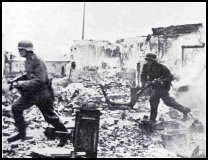July 14,
1942
British forces follow-up attacks on
"Kidney Ridge" at El Alamein. Minor advances are made against heavy
opposition..
4th Panzer Army is
redirected south to assist in taking the Caucuses with Army Group A.
Return to
the top
July 15,
1942
Soviet forces abandon Millerovo, half
way between Kharkov and Stalingrad. Also, Kamensk on the Donetz river was
abandoned. German commanders begin to express concern in that they have captured
less than 80,000 Soviet forces since the start of the offensive, much less than
what had been planned and expected.
New Zealand forces begin attacks on
Rommel's forces at "Kidney Ridge". The attacks are met by tenacious
German resistance, but at the end of the day, the key ridge is cleared.
Meanwhile, the Italian Brescia and Pavia divisions are routed, forcing Rommel to
send German troops north to stablize the situation, ending his hopes at a
meaningful attack in the south.
British cryptographers broke the German
anti-aircraft unit ciphers. The "Weasel" cipher was particularly important
because it allowed the Allies to track the important 88mm AT/AA units.
The first 2000 Dutch Jews were deported
to Auschwitz.
Return to
the top
July 16,
1942
Rommel launches desperate attacks against the
Ruweisat Ridge and Tell el Eisa, but is unable to dislodge the Commonwealth
forces.
Return to
the top
July 17,
1942
New Zealand forces
succeed in routing the Germans from the "Kidney" Ridge positions. The
British take 2,600 prisoners and capture 115 guns. El Alamein, and eastern
Egypt, has been saved.
Churchill
suspends convoys to Murmansk after the PQ17 disaster.
Return to
the top
July 18, 1942
Soviet forces are in full retreat on the southern front as German forces
capture Voroshilovgrad in the Donets Basin.
Return to
the top
July 19,
1942
The
French Gestapo initiated the "Family Hostage Law" whereby if any French
"terrorist' identified by the German occupation forces did not surrender
within 10 days of their "crime", all adult male relatives would be executed,
adult females would be sent to concentration camps and children would become
charges of the Germans state.
Return
to the top
July 20,
1942
Operation Eagle commences as the
Germans attack Russian partisan positions in the Chechivichi area of
Byelorussia.
Soviet counterattacks succeeded in
eliminating the German bridgehead on the east bank of the Don at Vorohezh.
Return to the top
July 21, 1942
16,000 Japanese troops land at Buna,
new Guinea.
The US military reports that since the
beginning of the war, 44,143 soldiers have been killed, wounded or are missing.
Commonwealth infantry attack at El
Alamein attempting to breach the Axis fixed positions.
Return to the top
July 22, 1942
The British 8th Army, with a
new complement of 323 tanks (against Rommel's 92) attacks. Auchinleck's
forces manage to loose 131 tanks and 2,600 prisoners were taken by the Germans.
Lt. Kurt Waldheim (who would become
Austrian PM) is awarded the Silver Medal by the Croats for his outstanding work
in determining the number of trucks needed to deport innocent civilians out of
partisan controlled areas.
German forces enter Rostov. Heavy
house-to-house fighting erupts in the city.
The Treblinka death camp is opened. The
Germans begin moving the Jews of the Warsaw Ghetto to the new camp, the vast
majority would be murdered upon arrival.
Return to the top
July 23, 1942
Japanese forces begin
landing the 18th Army at Buna and Gona on the northern coast of
Papua. The operation is intended to take Port Morseby.
German
submarines lay mines at the approaches to the mouth of the Mississippi River.
Return to the top
July 24, 1942
1st
Panzer Army captures Rostov-on-Don, unhinging the Soviet defensive positions in
the far south. The armies are now free to move to the Caucasus.
Return to the top
July 25, 1942
German
forces capture Novocherkassk, northeast of Rostov.
Return to the top
July 26, 1942
Auchinleck
suspends offensive operations at El Alamein after three days of heavy fighting
which bags 7,000 Axis prisoners. Exhausted by the efforts, the British 8th
Army begins to dig in.
Return to the top
July 27, 1942
The German 6th Army launches
attacks against the Soviet bridgeheads west of the Don at Kalach. The Soviets
hang on with grim determination and the attacks fail. The Germans cross the Don
River at Rostov and occupy Bataysk.
British Bomber Command launches an
"all out effort" sending 403 bombers against Hamburg. Heavy damage was
reported as 337 civilians were killed, and 14,000 were homeless after the bombs
and fires destroyed 823 homes. British losses in the raid were heavy - 29
planes (7.2%).
Return to the top
1941 Archive:
June
| July
| August | September
| October | November | December
1942 Archive:
January
| February | March
| April | May | June
Special Editions:
Pearl
Harbor | The Doolittle Raid | Midway
Editor's
Corner Archive:
The
Past Through Tomorrow "It
is quite frightening to realize just how similar our nation's actions
have been and appear to be heading when compared this way..."
Afghanistan
and Vietnam: When the "war against
terrorism" began, many knowledgeable people warned that our operations
in Afghanistan would turn into another Vietnam.
Want to Win - Think Before You Lash Out
- "If we are serious about taking the war to the enemy, it is time to
look ..."
The
First Fight Against Fascism - We must remember the Spanish Civil
War also.
Arguing
Victory - "... Each nation who fought against fascist tyranny in WWII brought with it
part of whole needed to defeat that evil..."
War, Glory,
Honor and Remembrance - "War is a
brutal and savage insult on human society..."
The
First Casualty... in time of war, those in power are even more inclined to hide the truth,
since that truth is often manifest in the most gruesome and terrible
acts.
Those wishing to
contribute items. stories or comments should contact D.A.
Friedrichs
|

